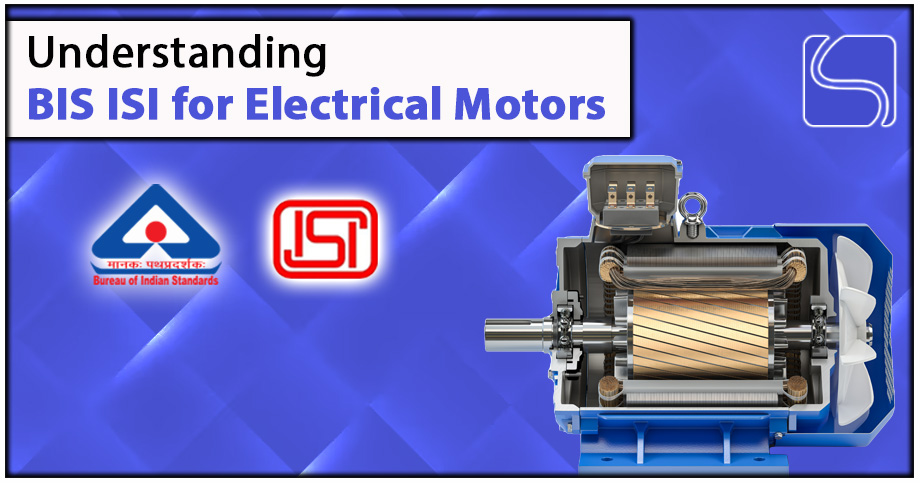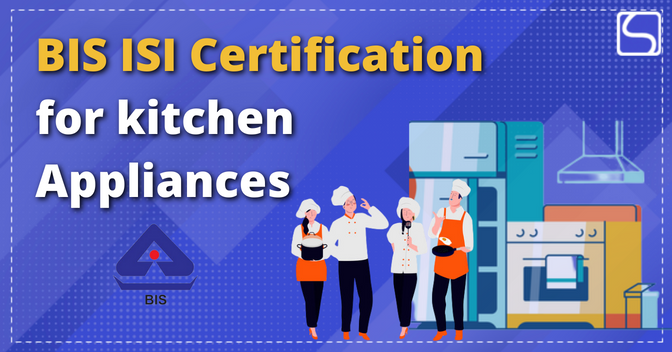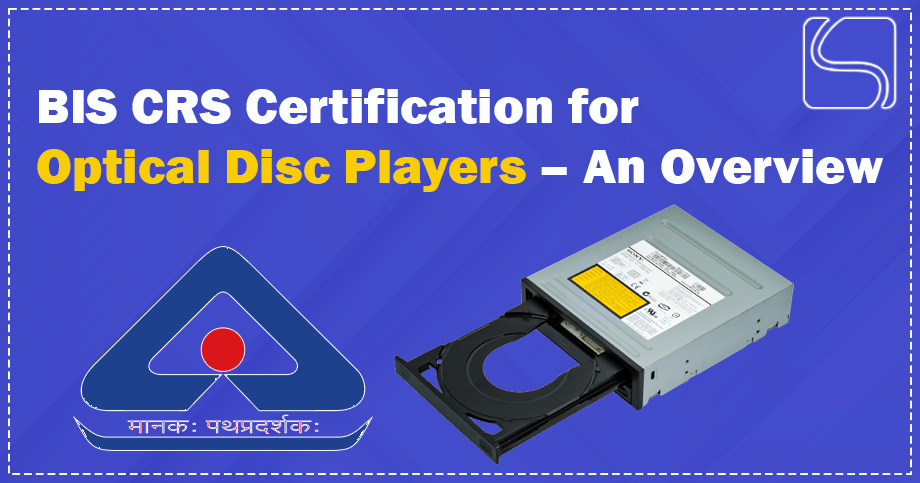Understanding BIS ISI for Electrical Motors

Shivam Narwal | Updated: Mar 18, 2023 | Category: BIS
The Bureau of Indian Standards (BIS) is a national body that sets standards for various products and services in India. The Indian Standards Institute (ISI) is a certification mark issued by BIS to products that meet the prescribed standards. In the context of electrical motors, BIS ISI certification is mandatory in India. This certification ensures that the motors meet certain quality and safety standards and are suitable for use in India’s diverse and challenging operating conditions.
Table of Contents
Why is BIS ISI Certification Required for Electrical Motors in India?
The BIS ISI certification for electrical motors is mandatory in India for several reasons. Firstly, it ensures that the motors meet certain quality standards. This is important because electrical motors are used in a wide range of applications, from household appliances to industrial machinery. Poor quality motors can result in inefficient operation, frequent breakdowns, and increased maintenance costs. BIS ISI certification ensures that the motors meet certain performance criteria, such as efficiency, power factor, and noise level, which helps to ensure their reliability and longevity.
Secondly, BIS ISI certification is important from a safety perspective. Electrical motors can pose significant safety risks if they are not designed and manufactured to certain standards. In India, where electrical infrastructure can be unreliable and power outages are common, it is particularly important that electrical motors are designed to withstand voltage fluctuations and other electrical disturbances. BIS ISI certification ensures that the motors are tested for safety parameters, such as insulation resistance, dielectric strength, and protection against electric shock, which helps to ensure their safe operation.
BIS ISI Certification Process for Electrical Motors in India
The BIS ISI certification process for electrical motors in India is a comprehensive and rigorous process that involves several steps. The process is designed to ensure that the motors meet certain quality and safety standards and are suitable for use in India’s diverse and challenging operating conditions.
Step 1: Application for Certification
The first step in the BIS ISI certification process is to submit an application for certification to BIS. The application must include details of the motor, such as its voltage, frequency, power rating, and intended use. The application must also include technical documents, such as drawings, specifications, and test reports, that demonstrate that the motor meets the relevant standards.
Step 2: Preliminary Factory Inspection
Once the application has been received, BIS conducts a preliminary factory inspection to assess the manufacturer’s production facilities and quality control systems. The inspection is conducted to ensure that the manufacturer has the necessary resources, expertise, and equipment to produce motors that meet the prescribed standards.
Step 3: Type Testing
The next step in the BIS ISI certification process is type testing. Type testing is a comprehensive testing process that is conducted on a sample of the motor to assess its compliance with the relevant standards. The testing process includes a range of tests, such as efficiency testing, temperature rise testing, and insulation resistance testing. The type testing process is designed to ensure that the motor meets the prescribed quality and safety standards.
Step 4: Initial Factory Inspection
Once the type testing has been completed and the motor has passed all the prescribed tests, BIS conducts an initial factory inspection to ensure that the motor is being produced in compliance with the prescribed standards. The inspection includes a review of the manufacturer’s quality control procedures, production facilities, and product testing procedures.
Step 5: Grant of Certification
If the motor meets all the prescribed quality and safety standards, BIS grants certification to the manufacturer. The certification mark[1] can then be affixed to the motor, indicating that it meets the prescribed standards.
Benefits of BIS ISI Certification for Electrical Motors in India
BIS ISI certification for electrical motors in India offers several benefits to manufacturers, consumers, and the industry as a whole.
- Benefits for Manufacturers
BIS ISI certification for electrical motors in India provides several benefits to manufacturers. Firstly, it helps manufacturers to improve the quality and reliability of their products, which can lead to increased customer satisfaction and loyalty. Secondly, it helps manufacturers to demonstrate their commitment to quality and safety, which can help to enhance their brand reputation and competitiveness in the market. Thirdly, BIS ISI certification can help manufacturers to comply with regulatory requirements, which can help to avoid legal and financial penalties. - Benefits for Consumers
BIS ISI certification for electrical motors in India provides several benefits to consumers. Firstly, it helps consumers to identify high-quality and safe electrical motors that meet the prescribed standards. This can help consumers to make informed purchasing decisions and avoid purchasing substandard or unsafe products. Secondly, BIS ISI certification can help to ensure the reliability and longevity of electrical motors, which can help to reduce maintenance costs and improve the overall efficiency of electrical systems. Thirdly, BIS ISI certification can help to improve the safety of electrical systems, which can help to reduce the risk of electrical accidents and injuries. - Benefits for the Industry
BIS ISI certification for electrical motors in India provides several benefits to the industry as a whole. Firstly, it helps to establish uniform quality and safety standards for electrical motors, which can help to promote fair competition and prevent the proliferation of substandard or unsafe products in the market. Secondly, BIS ISI certification can help to improve the overall quality and reliability of electrical systems, which can help to enhance the productivity and competitiveness of various industries. Thirdly, BIS ISI certification can help to ensure the safety of electrical systems, which can help to reduce the risk of accidents and injuries in various industries.
Challenges of BIS ISI Certification for Electrical Motors in India
While BIS ISI certification for electrical motors in India offers several benefits, it also poses several challenges to manufacturers, regulators, and consumers. Some of the key challenges are discussed below:
- Costs: BIS ISI certification can be a costly process for manufacturers, particularly for small and medium-sized enterprises. The costs of type testing, factory inspections, and certification can be prohibitively high for some manufacturers, which can make it difficult for them to enter or compete in the market.
- Time: BIS ISI certification can also be a time-consuming process, which can delay the introduction of new products or technologies in the market. The time required for type testing, factory inspections, and certification can vary depending on various factors, such as the complexity of the product, the availability of testing facilities, and the workload of BIS officials.
- Capacity: BIS has limited capacity to process certification applications and conduct factory inspections, which can result in delays or backlogs in the certification process. This can be particularly problematic for manufacturers who are trying to introduce new products or technologies in the market.
- Enforcement: While BIS ISI certification is mandatory in India, the enforcement of the certification requirement can be weak or inconsistent. Some manufacturers may bypass the certification requirement or use counterfeit certification marks, which can undermine the integrity of the certification system and compromise the safety and quality of electrical systems.
Conclusion
BIS ISI certification for electrical motors in India is a critical requirement that helps to ensure the quality, safety, and reliability of electrical systems. The certification process is comprehensive and rigorous, involving several steps, including type testing, factory inspections, and certification. While BIS ISI certification offers several benefits to manufacturers, consumers, and the industry as a whole, it also poses several challenges, such as high costs, time constraints, capacity constraints, and enforcement issues. To address these challenges, it is important for BIS to adopt measures that can streamline the certification process, increase the capacity of testing facilities and BIS officials, and enhance the enforcement of the certification requirement. Additionally, it is important for manufacturers to prioritize quality and safety in their products and work with BIS to ensure compliance with the certification requirement.
Overall, BIS ISI certification for electrical motors in India is an essential requirement that helps to ensure the safety and quality of electrical systems in the country. By addressing the challenges and improving the effectiveness of the certification process, BIS can continue to play a critical role in promoting fair competition, enhancing productivity and competitiveness, and protecting the interests of consumers and the industry.
Also Read:
BIS Certification for Room heaters
BIS ISI certification for Electrical motors
Requirements for BIS ISI certification for Iron Products














